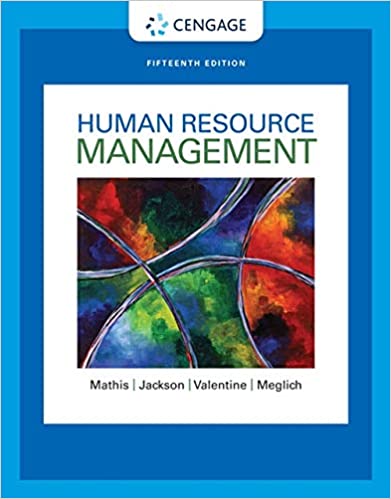
Human Resource Management 15th Edition by Robert Mathis,John Jackson,Sean Valentine ,Patricia Meglich
Edition 15ISBN: 978-1305500709
Human Resource Management 15th Edition by Robert Mathis,John Jackson,Sean Valentine ,Patricia Meglich
Edition 15ISBN: 978-1305500709 Exercise 2
Want to Earn a Bonus? Work for Uncle Sam
There is generally much criticism when it comes to compensating executives employed in for-profit business. But federal employees in a number of agencies also reaped generous incentive pay despite subpar performance, including when they made decisions contrary to their agency's mission and values.
The Internal Revenue Service (IRS) handed out nearly $3 million in performance bonuses to 2,800 employees who had recently been disciplined. The employees had committed a wide range of infractions, including fraud, failure to pay taxes, and misuse of government travel cards. Some of the employees had been disciplined with reprimands, suspension, and even termination. However, the IRS generally doesn't take into account such conduct issues when determining bonuses. IRS employees who are represented by a labor union are not prevented from receiving a performance bonus even if they are subject to disciplinary action.
The situation at the Veterans Administration was even more outrageous. Nearly $300 million in annual bonuses were distributed at this provider of health care to American military veterans. A scandal erupted when it was discovered that to meet agency performance metrics, treatment for many veterans was delayed. To encourage higher productivity, the VA management team changed performance targets for claims processors between 2010 and 2012. VA claims processors would be rewarded for processing a high volume of claims. Difficult, complicated cases were set aside because they were time-consuming to process and would result in no bonus for the processor. The incentive system worked, but at what cost?
Incentives were not limited to claims processors. Executives at the VA earned performance bonuses as well-totaling $2.7 million. Allegations of misrepresenting patient wait times to make it appear that services were provided on a timely basis have spread throughout the VA system. Performance bonuses were paid to VA hospitals that had low backlogs for treatment. In an effort to earn the incentives, some employees were directed not to put veterans on wait lists, making it appear that wait times were short.
Federal officials took the agency's leadership to task and noted that there was an extreme reluctance to hold employees and executives accountable. Decisions made by many of these managers caused harm to veterans seeking health care. After a unanimous vote to eliminate all bonuses, lawmakers reversed themselves a few months later in 2014 when they reinstated the bonus program but capped it at $360 million per year.
What recommendations would you have for using incentive programs at these agencies in the future?
There is generally much criticism when it comes to compensating executives employed in for-profit business. But federal employees in a number of agencies also reaped generous incentive pay despite subpar performance, including when they made decisions contrary to their agency's mission and values.
The Internal Revenue Service (IRS) handed out nearly $3 million in performance bonuses to 2,800 employees who had recently been disciplined. The employees had committed a wide range of infractions, including fraud, failure to pay taxes, and misuse of government travel cards. Some of the employees had been disciplined with reprimands, suspension, and even termination. However, the IRS generally doesn't take into account such conduct issues when determining bonuses. IRS employees who are represented by a labor union are not prevented from receiving a performance bonus even if they are subject to disciplinary action.
The situation at the Veterans Administration was even more outrageous. Nearly $300 million in annual bonuses were distributed at this provider of health care to American military veterans. A scandal erupted when it was discovered that to meet agency performance metrics, treatment for many veterans was delayed. To encourage higher productivity, the VA management team changed performance targets for claims processors between 2010 and 2012. VA claims processors would be rewarded for processing a high volume of claims. Difficult, complicated cases were set aside because they were time-consuming to process and would result in no bonus for the processor. The incentive system worked, but at what cost?
Incentives were not limited to claims processors. Executives at the VA earned performance bonuses as well-totaling $2.7 million. Allegations of misrepresenting patient wait times to make it appear that services were provided on a timely basis have spread throughout the VA system. Performance bonuses were paid to VA hospitals that had low backlogs for treatment. In an effort to earn the incentives, some employees were directed not to put veterans on wait lists, making it appear that wait times were short.
Federal officials took the agency's leadership to task and noted that there was an extreme reluctance to hold employees and executives accountable. Decisions made by many of these managers caused harm to veterans seeking health care. After a unanimous vote to eliminate all bonuses, lawmakers reversed themselves a few months later in 2014 when they reinstated the bonus program but capped it at $360 million per year.
What recommendations would you have for using incentive programs at these agencies in the future?
Explanation
Compensation, incentives and bonuses are...
Human Resource Management 15th Edition by Robert Mathis,John Jackson,Sean Valentine ,Patricia Meglich
Why don’t you like this exercise?
Other Minimum 8 character and maximum 255 character
Character 255


